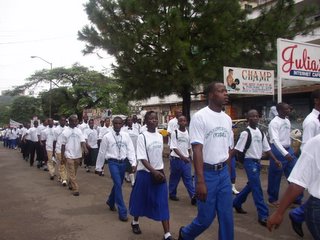My husband bought us a car today! Ever since we returned to Liberia last December, we have been walking, getting lifts (many times from strangers!), taking overcrowded taxis—and yes, even buses, much to the surprise and amusement of the people inside. For safety and emergency reasons, I am glad for the car with its seatbelts that we will use.
I didn’t mind being
without a car, but now that we have one I feel a little more…what? Civilized? Dignified? The worst thing about stopping a taxi, to me at least, is having to use various hand signals to let the approaching driver know where you’re going: point downwards if you’re stopping just a few blocks up the street; point straight ahead of you if you’re going to Old Road; point at an angle towards the right if you’re going to Airfield; and, the worst (my direction of course), shake your hand from the wrist (palm facing out and fingers splayed) if you’re going straight towards Congo Town, ELWA, Paynesville and Red Light. Other bad things are having to wait for ages to get a taxi towards town in the morning; having to watch the drivers face frequent and shameless harassment and extortion by underpaid policemen; and having to fight, sometimes literally, for a place in a taxi to go back home at the end of the workday.
I will certainly miss the public transportation though, because that is where some good stories are. Among the people you hear opinions, feel vibes, get news, and, especially during these 2005 campaign/Election days, hear and see a passion that is inspiring—no matter which presidential candidate has captured the speaker’s heart. Citizens articulate their hopes and dreams, debate the issues, and sometimes engage in arguments so bitter they would escalate to fisticuffs were the people not constrained in the vehicle. The best thing is that we are actually free to say whatever we want. I clearly remember past times in our history (1985 and 2000 in particular) when saying the ‘wrong’ thing could get you dragged off to Central (or worse).
Other good things about riding the taxis are the heartwarming gestures of civility—the sincere greetings when someone new enters the car; the huge effort to make space and welcome overweight people with humorous fat comments that they really don’t mind; the kind-hearted drivers who reduce the fare for poor people who plead in desperation; and the jokes that help us all laugh at our sometimes rather undignified lives.
Come to think of it, I am
not going to abandon the taxis. Moving up in that sense would mean moving out—out of touch, and perhaps out of empathy. So, every now and then, when I’ve had a good dose of comfort and convenience, I’m going to stand on Tubman Boulevard and wag my hand towards Congo Town without a second thought about how it looks.




 The last time I saw Saah alive, he was at my doorstep delivering keys to me on behalf of his father, a friend and coworker. He had just started college and was very nicely dressed. We attended his wake last night, and today, on this dreary, rainy Saturday as Heaven cried with us, he was buried in a cemetery by the Atlantic Ocean. Saah was only 23 years old and was his parents’ pride, joy and hope. During a rainstorm on the night of October 2nd, as he knelt by his wounded mother’s side begging for their lives, an armed robber ignored his pleas and shot him too. His 10-year old sister was also violently attacked. Saah’s mother and sister lived to tell the story, but they weren’t able to leave the hospital today to attend his funeral. We went to see them there afterwards, but there was nothing anyone could say. All we could do was pray.
The last time I saw Saah alive, he was at my doorstep delivering keys to me on behalf of his father, a friend and coworker. He had just started college and was very nicely dressed. We attended his wake last night, and today, on this dreary, rainy Saturday as Heaven cried with us, he was buried in a cemetery by the Atlantic Ocean. Saah was only 23 years old and was his parents’ pride, joy and hope. During a rainstorm on the night of October 2nd, as he knelt by his wounded mother’s side begging for their lives, an armed robber ignored his pleas and shot him too. His 10-year old sister was also violently attacked. Saah’s mother and sister lived to tell the story, but they weren’t able to leave the hospital today to attend his funeral. We went to see them there afterwards, but there was nothing anyone could say. All we could do was pray.
 I sat in on a class at a little community school today and listened as the teacher taught his class about the People's Redemption Council that overthrew President Tolbert's government in the April 1980 coup d'etat. As he wrote on the board I was reminded of a placard I saw recently that said "Educated Fools! Your education has done nothing for us!"
I sat in on a class at a little community school today and listened as the teacher taught his class about the People's Redemption Council that overthrew President Tolbert's government in the April 1980 coup d'etat. As he wrote on the board I was reminded of a placard I saw recently that said "Educated Fools! Your education has done nothing for us!"